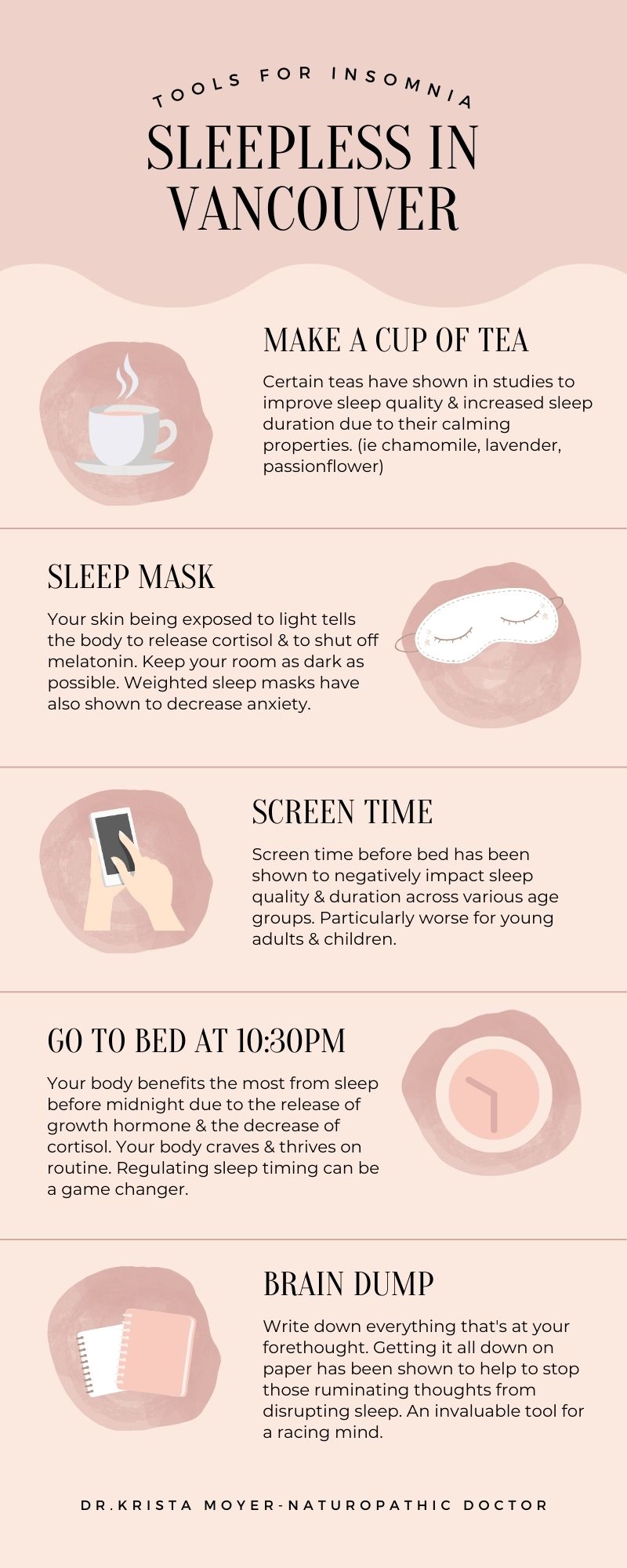Insomnia can be very easy or sometimes very tricky to treat. There are a myriad of reasons why you may be struggling to fall asleep &/or stay asleep.
What are the basics on insomnia
Eating and drinking before bed
- Eating too close to bedtime can make it difficult to fall asleep, as your body is digesting the meal – which creates heat. Your blood sugar will also be jumping up/down all night disturbing your slumbers
- Drinking too many fluids right before bed can cause you to wake up to pee.
- Alcohol may make you feel more relaxed, but it prevents deep restorative sleep.
Bedroom Temperature
When we’re transitioning into sleep, the body needs to decrease its temperature, so cooler rooms are a better option. On the opposite side, studies have shown taking a bath before bed helps with onset of sleep, as it helps to lower your body temperature.
Screentime…We know, we know
Ideally we should all be avoiding screen time within that last hour before bed. Blue light impacts the brain’s message that it’s night time. Think of blue skies during the day.
What time should we be going to bed?
We benefit the most from sleep when we climb into bed around 10-10:30PM and lights out no later than 11PM. There’s an inverse relationship with cortisol and growth hormone. So if we’re able to get into bed sooner, cortisol can drop and growth hormone is released. However, if we push through to a later bedtime, cortisol will begin to rise again, and growth hormone will be shunted. So as adults, this is our repairing hormone.
Herbal Medicine to aid sleep
Valerian is our strongest sedative herb. It’s also great at being restorative over time to the nervous system. So that means it can support you over time, so that you might not necessarily need to take it every night to ensure a great sleep. Bad news, this herb smells and tastes nasty! But good news, you can take it in a tablet or capsule. Or my fav nighty night tea by Traditional Medicinals does a fantastic job at disguising the taste amongst other great herbs which also support sleep. Other great herbs that studies have shown increase the duration and quality of sleep are common herbs – lavender, chamomile, and passionflower.
Brain Dump
Studies have shown that when we have ruminating thoughts preventing our sleep, if we can put pen to paper and write it out, it allows the brain to know that we’ve received the message and GABA can be released to allow the onset of sleep. It doesn’t have to be a novel, more so, what are the key things your brain is screaming at you to pay attention to.
Other nice things for sleep
Sometimes stress is preventing the brain from transitioning into sleep. GABA and L theanine are two lovely options to support that. Studies have shown that L-theanine supplementation can reduce sleep onset latency, increase total sleep time, and enhance overall sleep quality. Additionally, L-theanine’s effects are potentiated when combined with magnesium (Magnesium bisglycinate and Threonate are the best forms for sleep quality), which enhances GABAergic activity, leading to improved sleep duration and quality. Studies involving GABA and L-theanine showed significant improvements in sleep quality as measured by the Pittsburgh Sleep Quality Index. GABA on its own has shown in research to enhance sleep by reducing latency and increasing non-REM sleep duration.
While high dosages can be sedative, lower dosages during the day are great for anxiety, focus and concentration. But depending on the person, lower dosages before bed can also help with falling asleep and staying asleep.
Final Thoughts
In the end, sleep isn’t just a dream—it’s achievable with the right tools. Whether it’s meditation, cutting out late-night Netflix binges, or finally realizing that coffee at 4 PM wasn’t your best idea, your path to better rest is closer than you think. Sweet dreams, and may your sheep-counting days be numbered!







